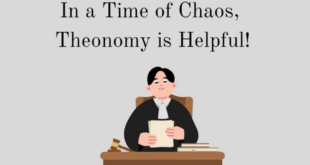In the previous article, we explored the definition of Biblical theology in view of the major themes that are seen throughout Scripture: Covenants, Temple, and the Kingdom of God. We ended after the sin of Adam, to which, the serpent is promised to have a lethal blow to his head inflicted by the ‘Seed’ of the woman someday. Let’s continue:
The consequences ensue from mankind’s insurrection against their Creator: physical death will eventually come to mankind (Genesis 3:19), death is required to cover the sins of man (Genesis 3:21), and mankind is driven out of the garden of Eden with the cherubim guarding the entrance (a physical separation from God’s temple dwelling place, Genesis 3:24). As promised, mankind’s sins multiply and progress, painting a terrible stain on this once perfect world (Genesis 4-5). This progresses all the way until God sees the terrible wickedness that has become of mankind, and decides to destroy all of life on earth. Despite mankind’s evil, Noah “found grace” (Hebrew word for “favor”)(1) with the LORD (Genesis 6:8 CSB).”(2)
In the Noahic Covenant, we see the unconditionality of grace from the very start in Genesis 6:8. Once God chose Noah to be His person (and his family) that is set apart to do His will, God gives the condition: build an ark (boat to God’s specification), put your family on the ark, and fill it with two of every land animal because God is bringing a flood as judgment to destroy life on earth (Genesis 6:14-21). Noah does all that God commanded of him (Genesis 6:22) and his family and two of every land creature is rescued from judgment (Genesis 7). The ark resembled mankind’s need for rescue from our terminal state of sin.
Once the floodwaters recede, Noah, his family, and the animals exit the ark with a command from God: be fruitful, multiply, and fill the earth (Genesis 9:1) which is a direct reference to the original mission given to Adam in Genesis 1:28. God sends the rainbow in the sky as the covenant promise to never destroy all of life again on earth (Genesis 9:11-17). Nonetheless, once Noah and his family leave the ark, sin still is prevalent as we see with Noah getting drunk and the shame of his son, Ham (Genesis 9:20-27). The renewed mission and restart (for lack of a better term) of creation was not the restoration that mankind needs to deal with the terminal sin issue. God was showing that mankind, just as Adam needing a death to cover his sin that was committed in the garden of Eden, needs an ultimate rescue by unconditional grace.
The story of Genesis progresses to our next covenant: the Abrahamic Covenant. God unconditionally chooses Abram (later changed his name to Abraham) out of a pagan nation (Joshua 24:2-3). Once God chooses Abraham, He establishes His covenant with Abraham: God will make Abraham “into a great nation… and all the peoples on the earth will be blessed through you (Genesis 12:2-3 CSB).” God’s conditions from Abraham: leave his homeland (Genesis 12:4-9), live in God’s presence and be blameless (Genesis 17:1), and circumcise all of the males (Genesis 17:10-11). (3) This land that God promised Abraham may also coincide with the garden of Eden in geographical location. (4) So as we have seen as a pattern in the Kingdom of God, God has chosen Abraham and his lineage to be a blessing to all the nations (God’s people), in a land (Canaan) that God has given him (God’s place), and to be a people set apart from the rest of the world for God Himself (under God’s rule and blessing). (5) This, yet again, did not remove the sin issue that mankind is facing, but is still pointing forward to this lineage that will bless all of the nations.
As promised to Abraham in Genesis 15:13, Abraham’s lineage falls into 400 years of slavery to the Egyptians and Pharoah. This gives rise to Moses, a murderer (Exodus 2:11-12) called by God and commanded to lead the Hebrew people out of slavery into the land God promised (Exodus 1-14). After God rescues His people from the Egyptians, He gives the law to them and demands their loyalty by keeping the law (Exodus 20:1-17). (6) By keeping these laws, God promises that they would be His possession set apart from all people and that they would be a “kingdom of priests and my holy nation (Genesis 19:5-6 CSB).” If the people disobey, God promises that judgment will come to the people (Exodus 20:5-6). (7) God gives many more laws to observe and obey throughout Exodus and Leviticus with many different purposes (setting a people apart for Himself, protecting them from sin, etc.). However, the law provided the Israelites with a provision for how to deal, temporarily, with their sin problem. (8) Through a long and lengthy journey, these people (without Moses and in a different generation) would eventually enter into the Promised Land (Canaan). We continue to see the pattern: the Israelites were rescued out of the bondage of slavery (God’s people) to the land of Canaan and commanded to build God an ark and temple (God’s place), (9) and were given the law and eventually a king (God’s rule and blessing). Of course, this was only a temporary fix. The people were still waiting for their final victor that would crush the head of the serpent in Genesis 3.
Footnotes
1. Brown, Driver and Briggs, The Brown- Driver- Briggs Hebrew and English Lexicon, (Massachusetts: Hendrickson Publishers, 1906), 336.
2. Jay P Green, Sr., The Interlinear Hebrew-Aramaic Old Testament, 2nd ed. (Massachusetts: Hendrickson Publishers, 1985), 14.
3. Third Millennium Ministries. “Kingdom, Covenants, & Canon of the Old Testament Lesson 3: Divine Covenants.”https://thirdmill.org/seminary/lesson.asp/vid/40
4. Third Millennium Ministries. “Kingdom, Covenants, & Canon of the Old Testament Lesson 2: The Kingdom of God.”https://thirdmill.org/seminary/lesson.asp/vid/39
5. Vaughn Roberts, God’s Big Picture (Illinois: InterVarsity Press, 2002), 56.
6. Third Millennium Ministries. “Kingdom, Covenants, & Canon of the Old Testament Lesson 3: Divine Covenants.”
7. Third Millennium Ministries. “Kingdom, Covenants, & Canon of the Old Testament Lesson 3: Divine Covenants.”
8. O. Palmer Robertson, Covenants (Pennsylvania: Great Commission Publications, 1987), 75.
9. Beale and Kim, God Dwells Among Us (Illinois: InterVarsity Press, 2014), 53.
The information was sourced from: Final Paper: The Kingdom of God, God’s Covenants, and Temple by Austin Rankin for Biblical Theology: BIB-600-2AO71 (Belhaven University)
 Getting Job-ed
Getting Job-ed


